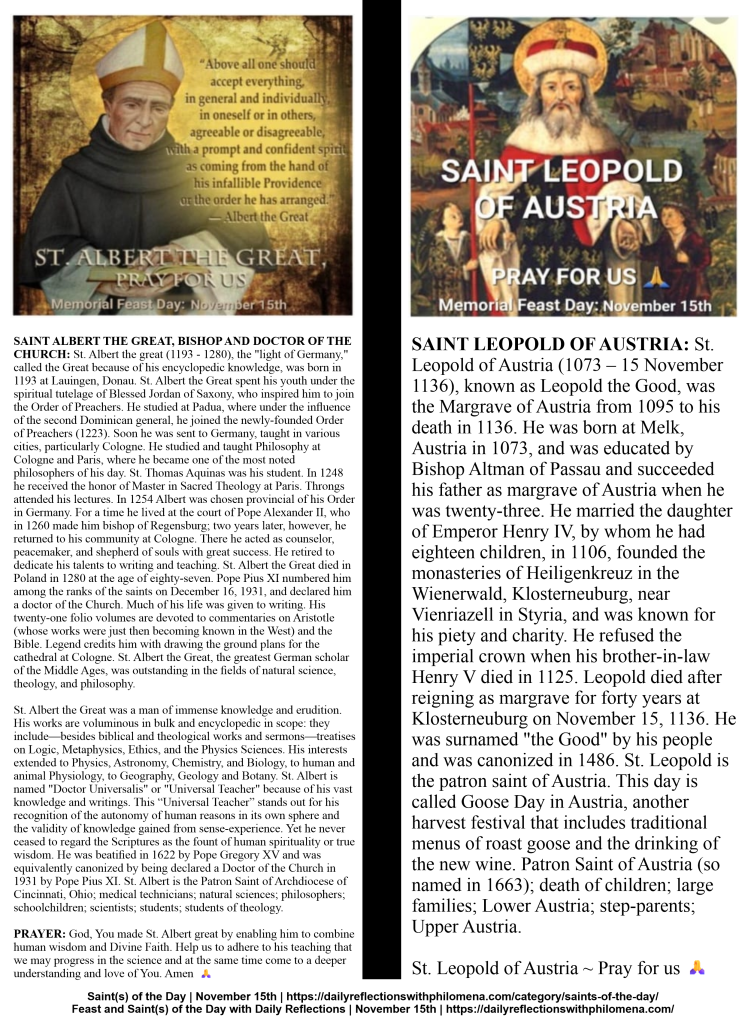
MEMORIAL OF SAINT ALBERT THE GREAT, BISHOP AND DOCTOR OF THE CHURCH AND SAINT LEOPOLD OF AUSTRIA – FEAST DAY ~ NOVEMBER 15TH: Today, we celebrate the Memorial of Saint Albert the Great, Bishop and Doctor of the church and Saint Leopold of Austria. Through the intercession of our Blessed Mother Mary and all the Saints on this feast day, we humbly pray for all Scientists, Philosophers and students. We pray for all parents, for peace, love, justice and unity in our marriages, our families and our world. We pray for the sick and dying, especially those who are mentally and physically ill, stroke, heart diseases and those suffering from cancers and other terminal diseases.
SAINT ALBERT THE GREAT, BISHOP AND DOCTOR OF THE CHURCH: St. Albert the great (1193 – 1280), the “light of Germany,” called the Great because of his encyclopedic knowledge, was born in 1193 at Lauingen, Donau. St. Albert the Great spent his youth under the spiritual tutelage of Blessed Jordan of Saxony, who inspired him to join the Order of Preachers. He studied at Padua, where under the influence of the second Dominican general, he joined the newly-founded Order of Preachers (1223). Soon he was sent to Germany, taught in various cities, particularly Cologne. He studied and taught Philosophy at Cologne and Paris, where he became one of the most noted philosophers of his day. St. Thomas Aquinas was his student. In 1248 he received the honor of Master in Sacred Theology at Paris. Throngs attended his lectures. In 1254 Albert was chosen provincial of his Order in Germany. For a time he lived at the court of Pope Alexander II, who in 1260 made him bishop of Regensburg; two years later, however, he returned to his community at Cologne. There he acted as counselor, peacemaker, and shepherd of souls with great success. He retired to dedicate his talents to writing and teaching. St. Albert the Great died in Poland in 1280 at the age of eighty-seven. Pope Pius XI numbered him among the ranks of the saints on December 16, 1931, and declared him a doctor of the Church. Much of his life was given to writing. His twenty-one folio volumes are devoted to commentaries on Aristotle (whose works were just then becoming known in the West) and the Bible. Legend credits him with drawing the ground plans for the cathedral at Cologne. St. Albert the Great, the greatest German scholar of the Middle Ages, was outstanding in the fields of natural science, theology, and philosophy.
St. Albert the Great was a man of immense knowledge and erudition. His works are voluminous in bulk and encyclopedic in scope: they include—besides biblical and theological works and sermons—treatises on Logic, Metaphysics, Ethics, and the Physics Sciences. His interests extended to Physics, Astronomy, Chemistry, and Biology, to human and animal Physiology, to Geography, Geology and Botany. St. Albert is named “Doctor Universalis” or “Universal Teacher” because of his vast knowledge and writings. This “Universal Teacher” stands out for his recognition of the autonomy of human reasons in its own sphere and the validity of knowledge gained from sense-experience. Yet he never ceased to regard the Scriptures as the fount of human spirituality or true wisdom. He was beatified in 1622 by Pope Gregory XV and was equivalently canonized by being declared a Doctor of the Church in 1931 by Pope Pius XI. St. Albert is the Patron Saint of Archdiocese of Cincinnati, Ohio; medical technicians; natural sciences; philosophers; schoolchildren; scientists; students; students of theology.
PRAYER: God, You made St. Albert great by enabling him to combine human wisdom and Divine Faith. Help us to adhere to his teaching that we may progress in the science and at the same time come to a deeper understanding and love of You. Amen 🙏
SAINT LEOPOLD OF AUSTRIA: St. Leopold of Austria (1073 – 15 November 1136), known as Leopold the Good, was the Margrave of Austria from 1095 to his death in 1136. He was born at Melk, Austria in 1073, and was educated by Bishop Altman of Passau and succeeded his father as margrave of Austria when he was twenty-three. He married the daughter of Emperor Henry IV, by whom he had eighteen children, in 1106, founded the monasteries of Heiligenkreuz in the Wienerwald, Klosterneuburg, near Vienriazell in Styria, and was known for his piety and charity. He refused the imperial crown when his brother-in-law Henry V died in 1125. Leopold died after reigning as margrave for forty years at Klosterneuburg on November 15, 1136. He was surnamed “the Good” by his people and was canonized in 1486. St. Leopold is the patron saint of Austria. This day is called Goose Day in Austria, another harvest festival that includes traditional menus of roast goose and the drinking of the new wine. Patron Saint of Austria (so named in 1663); death of children; large families; Lower Austria; step-parents; Upper Austria.
St. Leopold of Austria ~ Pray for us 🙏